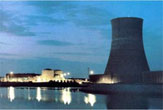Americans Warm to Nuclear Power and Sour on Oil

Nuclear power is becoming a more attractive alternative energy source to Americans, according to a new survey.
The survey results also indicated that the U.S. public is increasingly unhappy with oil and more willing to develop alternative energy sources such as wind and solar power. Also, while American concern over global warming is on the rise, people are apparently reluctant to pay to fight it.
"We're trying to understand what public policy in the U.S. should do to encourage new kinds of energy development or different patterns of energy consumption," said Stephen Ansolabehere, an MIT professor who conducted the study of 1,200 Americans.
The percentage of people who supported an increase in nuclear power grew from 28 percent in a survey conducted by MIT five years ago to 35 percent in the current survey. Ansolabehere said the increase was likely due to increased concern over carbon dioxide emissions from the burning of fossil fuels that is causing the current global warming.
Though support for nuclear power has increased, Americans still remain wary of the problem of storing nuclear waste. Nearly 40 percent of those surveyed opposed storing waste at Yucca Mountain, Nev., and only 28 percent agreed that "nuclear waste could be stored safely for long periods of time."
While doubts over nuclear power persist, oil has plummeted in popularity, ranking below nuclear power as the least popular fuel source. In the new survey, 74 percent of respondents wanted to decrease oil use, compared to 56 percent in the 2002 survey.
"People have really turned on oil in a big way," said Ansolabehere, who attributes the trend to rising prices and concern over the United States' foreign oil dependency.
Sign up for the Live Science daily newsletter now
Get the world’s most fascinating discoveries delivered straight to your inbox.
Cost remains a major factor in energy choices, the survey results indicate. People favor using more wind and solar energy until they are told that such alternative energy sources cost more than traditional sources like oil, gas and coal.
- What's Your Environmental Footprint?
- Power of the Future: 10 Ways to Run the 21st Century
- 10 Ways to Green Your Home

Andrea Thompson is an associate editor at Scientific American, where she covers sustainability, energy and the environment. Prior to that, she was a senior writer covering climate science at Climate Central and a reporter and editor at Live Science, where she primarily covered Earth science and the environment. She holds a graduate degree in science health and environmental reporting from New York University, as well as a bachelor of science and and masters of science in atmospheric chemistry from the Georgia Institute of Technology.









